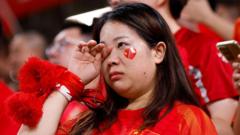In a striking revelation of despair, China's national football team's recent performance has brought its long-standing dreams of football greatness crashing down. On a sweltering night in Saitama, China faced Japan and suffered an astonishing 7-0 defeat that marked one of the lowest points in its football history. This latest loss follows a string of humiliating defeats, including unexpected falls to Oman and Hong Kong, amplifying criticism from fans and pundits alike.
The aftermath of the defeat saw a significant corruption scandal unfold, leading to a wave of arrests involving dozens of players and administrators entangled in match-fixing and bribery since a two-year investigation began. The team's situation has only worsened, as they sit at the bottom of their World Cup qualifying group following a 2-0 loss to Australia.
Notably, these setbacks come despite the initial fervor surrounding China's football ambitions, inspired by President Xi Jinping's vision for the nation to become a football powerhouse. In 2012, Xi articulated three aspirations: for China to qualify, host, and ultimately triumph in a World Cup. Today, however, even Xi's demeanor reflects a stark change; only recently, he described China's victory over Thailand as mere luck.
The underlying issues plaguing the sport are deeply rooted in China's political structure. Critics argue that the country’s top-down governance, which has propelled growth in sectors like electric vehicles and technology, has hindered football's development. A report from 2015 suggested that the Chinese Football Association (CFA) should gain autonomy from state oversight, yet reforms remain stagnant.
Moreover, the lack of grassroots development has stifled the sport’s growth. A systems expert noted that while many nations benefit from a vibrant pyramid of leagues that nurture talent, China’s framework appears inverted. The country has fewer than 100,000 registered football players, significantly less than England, whose player pool stands at 1.3 million. In essence, China lacks the foundational culture necessary for producing elite-level players.
Though the men's team's standing at 90th globally is disheartening, the women's team, ranked 17th, has provided a glimmer of success and pride. However, the domestic leagues have faced turmoil. Economic downturns following the pandemic have seen numerous clubs fold, exacerbating the challenges faced by the sport. Notable clubs like Jiangsu FC and Guangzhou Evergrande have experienced upheaval, the latter tethered to China’s debilitating property crisis.
Moreover, corruption has seeped into the sport's culture, with former national team coach Li Tie revealing shocking practices involving match-fixing and bribery within the system. Documentaries exposing corruption have reflected the deep-seated issues, as Li and other officials confessed to unethical practices, leaving many fans feeling disillusioned.
Despite these setbacks, the passion for football remains palpable among fans, who are left grappling with the vast inequalities between the development of individual sports and collective team pursuits like football. The emotional toll of the Japan defeat underscores a broader narrative of hope overshadowed by systemic failure. As the country's economic struggles continue, many wonder if football's misfortunes are merely emblematic of a greater imbalance in China’s national psyche. As one journalist remarked, "Football cannot thrive through mere rhetoric; it demands genuine skill and training devoid of political manipulation."




















